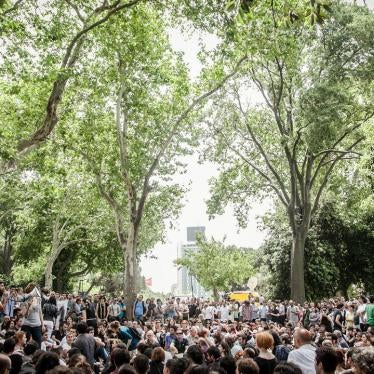(Berlin) — Osman Kavala appeared calm on Monday when he emerged from 600 days in pre-trial detention to take the stand in a landmark trial in which he faces a possible life sentence. “I’ve never been someone who sees overthrowing the government as a goal,” said the 62-year old Turkish civic leader, as he stood in a cavernous courtroom packed with lawyers, diplomats, and hundreds of observers.
But he is accused of doing just that -- masterminding the Gezi Park protests in 2013 in Istanbul to bring down the government. In a trial that mirrors many aspects of the deep-seated crisis in rule of law and human rights in the country, Kavala and the 15 other defendants are up against a state apparently determined to usurp the judicial system for the political end of silencing its critics.
A fantastical fiction
As if to underline this display of the authorities’ raw power, the trial is being held in a high-security jail complex in Silivri, a prison town on the outskirts of Istanbul. Armoured trucks guard the courtroom, while inside, ranks of soldiers in full combat gear flank the defendants. The size of a major sports hall, the courtroom is one of the largest in Turkey.
But Kavala, his co-defendants, and many in the public gallery refused to be cowed, creating a surprisingly vibrant courtroom atmosphere. Dozens of friends and supporters repeatedly clapped and waved as the two defendants in pre-trial detention– Kavala and Yiğit Aksakoğlu, who works for a foundation focused on early childhood development – entered and left the courtroom.
Hundreds of observers were present, as if to show the authorities that sham prosecutions will not happen without witnesses. Dozens of lawyers from across Turkey, robed in black, red and green, filled one side of the court. Opposite them sat many Turkish opposition MPs, foreign politicians and diplomats from Europe, Canada and the US.
The trial revolves around a 657-page indictment that purports to show how the 16 defendants, who include artists and civil society figures, conspired to organize and finance the 2013 protests, which spread to cities across Turkey. All face life in prison if found guilty. Yet in reality, as was starkly evident in court, the indictment is largely incoherent, packed with wild conspiracy theories, and containing no credible evidence of criminal activity. Maintaining his dignified and measured manner, Kavala called the indictment a “fantastical fiction”.
Non-violent protest
Based on transcripts of intercepted phone calls, foreign travel itineraries, social media postings, surveillance photos and financial records, the indictment is a crude re-writing of the history of the Gezi protests and makes little effort to explain why material is included or how it is evidence of crimes.
“I’ve been in prison 220 days and I still have no idea why I have been locked up all this time,” said Aksakoğlu. He is accused of getting instructions from Kavala to foment and perpetuate the Gezi protests, but there is no evidence they had any contact or had ever met. “The indictment says we had one 35-second phone call. How could I have received my orders in that time?” he asked the three judges.
Kavala and other defendants reminded the court that, rather than being a political conspiracy, ‘Gezi’ started as a sit-in to protect a local park and spiralled after police used teargas and excessive force. Five protesters and a policeman were killed in violence condemned around the world.
Memories of Gezi were stirred in the courtroom, some very painful. The mother of a 14-year old boy who died after police shot a teargas canister at his head, sat quietly in the public gallery.
“We were exercising our right to non-violent protest” Kavala said. The indictment indicates he contributed minor supplies to the protests – a folding table and some sandwiches – but nothing more. “I am no different from others who protested in Gezi” he added.
Several defendants who were members of Taksim Solidarity, a platform of groups active during the protests, have already been tried and acquitted in an earlier trial on the grounds that their right to peaceful assembly was protected.
Cigdem Mater, a film producer, said in her defense that the film on Gezi that the indictment accuses her of producing, was never actually made. “I am accused of having finished a film (in August 2013) two weeks before I in fact flew to (a meeting in) Sarajevo to discuss making this film!” she told the court.
The indictment claims the 16 plotted together to trigger Gezi. In reality, most barely knew each other. “My only contact with one co-defendant was a phone call in which I explained how to use hashtags on twitter,” Mater said.
Absurdities
Aksakoğu spoke movingly about the injustice of being separated from his young family. He spoke of his 3-year old daughter, Leyla, who he said has an imaginary game of reading the story of a blue lion from a book in a bag, though none of these items exist. “The indictment in this case is as real as my daughter’s game” he said.
The absurdities of the indictment highlight the urgency with which justice should prevail. At the end of a second day of the trial on June 25, the court released Aksakoğlu on bail but ruled that Kavala must remain in Silivri prison. As Aksakoğlu emerged from the prison late at night to be met by his loved ones and many frıends, he expressed joy that he was free in the same breath as deep sadness that Kavala – a man he had met only in the prison corridors – was still behind bars. The next trial hearing takes place on July 18-19. Osman Kavala’s release and a decision to drop the charges against all 16 defendants should be the only conceivable outcomes.









